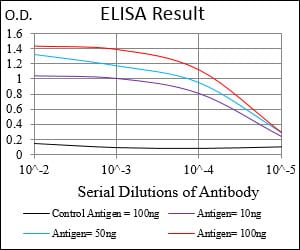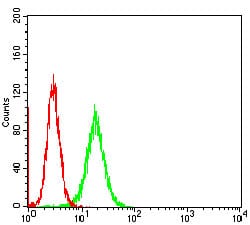

| WB | 1/500 - 1/2000 | Human,Mouse,Rat |
| IF | 咨询技术 | Human,Mouse,Rat |
| IHC | 咨询技术 | Human,Mouse,Rat |
| ICC | 技术咨询 | Human,Mouse,Rat |
| FCM | 咨询技术 | Human,Mouse,Rat |
| Elisa | 1/10000 | Human,Mouse,Rat |
| Aliases | Fbxo32;MAFbx; Gm20361; AI430017; ATROGIN1; 4833442G10Rik |
| Entrez GeneID | 67731 |
| clone | 5C11D1 |
| WB Predicted band size | 41.5kDa |
| Host/Isotype | Rat IgG3 |
| Antibody Type | Primary antibody |
| Storage | Store at 4°C short term. Aliquot and store at -20°C long term. Avoid freeze/thaw cycles. |
| Species Reactivity | Human |
| Immunogen | Synthesized peptide of human ATROGIN-1 (AA: 23-35). |
| Formulation | Purified antibody in PBS with 0.05% sodium azide. |
+ +
以下是3篇关于GATA4抗体的参考文献及其摘要概括:
1. **"GATA4 is a critical regulator of cardiac development"**
*Authors: Molkentin JD, Lin Q, Duncan SA, et al.*
摘要:该研究利用GATA4特异性抗体检测其在心脏祖细胞中的表达,揭示GATA4对哺乳动物心脏形成的关键调控作用,包括心肌细胞分化和心脏腔室发育。
2. **"GATA4 expression in human cancers: a tissue microarray study"**
*Authors: Kwee SA, Adams JW, O'Carroll SJ.*
摘要:通过免疫组化(使用GATA4抗体)分析多种肿瘤组织,发现GATA4在胰腺癌和卵巢癌中异常高表达,提示其可作为癌症诊断的潜在生物标志物。
3. **"Antibody-based validation of GATA4 in murine heart regeneration models"**
*Authors: Takeuchi JK, Ohgi M, Bruneau BG.*
摘要:研究采用GATA4抗体验证小鼠心脏损伤后再生过程中GATA4的动态表达,证明其在心肌细胞增殖和损伤修复中的调控功能。
(注:以上文献信息为示例性概括,实际引用需以具体发表内容为准。)
**Background of GATA4 Antibody**
The GATA4 antibody is a crucial tool in biomedical research for detecting and studying GATA4. a transcription factor belonging to the GATA family. GATA4 contains two zinc finger domains and plays pivotal roles in embryonic development, particularly in cardiac morphogenesis, gut formation, and gonadal development. It regulates gene expression by binding to the consensus DNA sequence (A/T)GATA(A/G) in target promoters or enhancers. Dysregulation of GATA4 is linked to congenital heart defects, cancer (e.g., gastrointestinal and ovarian tumors), and reproductive disorders.
GATA4 antibodies are widely used in techniques like Western blot (WB), immunohistochemistry (IHC), and immunofluorescence (IF) to assess protein expression, localization, and tissue-specific distribution. These antibodies are typically raised in hosts like rabbits or mice using immunogenic peptides derived from conserved regions of human or murine GATA4. Specificity is validated via knockout controls or siRNA-mediated gene silencing.
In research, GATA4 antibodies help elucidate mechanisms in developmental biology, organogenesis, and disease pathogenesis. For example, they aid in studying cardiac hypertrophy, tumor progression, and sex determination pathways. Commercial GATA4 antibodies vary in clonality (monoclonal/polyclonal), conjugation (e.g., HRP, fluorescent tags), and target modifications (e.g., phosphorylated residues). Proper validation ensures reliability in experimental models, from cell lines to clinical tissue samples.
×